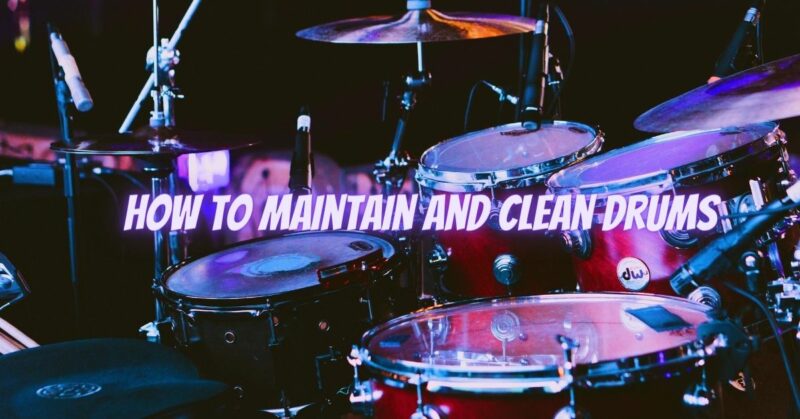Drums are not only musical instruments but also investments that require proper care and maintenance to ensure optimal performance and longevity. Regular maintenance and cleaning routines can help preserve the appearance, sound quality, and durability of your drums. In this article, we will guide you through essential steps and tips for maintaining and cleaning your drums, allowing you to keep the beat in top condition.
- Protecting Your Drums: Preventative measures go a long way in maintaining your drums. Here are some practices to consider:
a. Temperature and Humidity: Store your drums in a controlled environment, avoiding extreme temperatures and humidity levels. Extreme conditions can damage drumheads, shells, and hardware.
b. Drum Cases and Covers: Invest in quality drum cases or covers to protect your drums during transportation and storage. They provide cushioning and shield your drums from scratches, dents, and dust.
c. Proper Drum Placement: When setting up your drum kit, ensure that it is on a stable surface to prevent unnecessary movement or potential damage. Use drum mats or carpeting to protect hardwood floors and minimize slippage.
- Drumhead Maintenance: Drumheads are critical components of your drums, influencing sound quality and responsiveness. Regular maintenance ensures their longevity and optimal performance:
a. Tuning: Keep your drumheads properly tuned. Regularly check and adjust the tension of each drumhead to maintain pitch consistency and optimal sound quality.
b. Cleaning: Wipe down the drumheads with a soft, lint-free cloth after each playing session to remove dirt, oils, and debris. Avoid using harsh chemicals or abrasive cleaners that could damage the drumheads.
c. Replacement: Monitor the condition of your drumheads regularly. Replace them when they become worn, dented, or lose their responsiveness. Fresh drumheads improve sound quality and drum performance.
- Shell and Hardware Care: The shells and hardware of your drums require attention to maintain their appearance and functionality:
a. Cleaning: Use a soft, damp cloth to wipe down the shells and hardware regularly. Remove any dust, fingerprints, or grime. For stubborn stains or dirt, use a mild detergent or specialized drum cleaner.
b. Polishing: Periodically polish metal hardware components with a non-abrasive metal polish to maintain their shine and prevent corrosion. Follow the manufacturer’s instructions for specific products.
c. Hardware Maintenance: Inspect your drum kit’s hardware, including lugs, tension rods, brackets, and pedals, for any signs of wear, rust, or damage. Replace or repair any worn or faulty components promptly to prevent further damage.
- Cymbal Care: Cymbals contribute to the overall sound and aesthetics of your drum kit. Proper care helps extend their lifespan and preserve their sound quality:
a. Cleaning: After each playing session, wipe your cymbals with a soft cloth to remove fingerprints, oils, and dirt. Avoid using abrasive materials or cleaners that could scratch or damage the cymbal surface.
b. Protecting the Finish: Use cymbal sleeves, felt washers, or rubber grommets when stacking or storing cymbals to prevent direct metal-to-metal contact, which can cause cracks or damage.
c. Avoiding Harsh Substances: Avoid contact between cymbals and harsh substances such as solvents, detergents, or acidic liquids. These can corrode or discolor the cymbal surfaces.
- Regular Inspections: Perform routine inspections of your drums to identify any signs of wear, damage, or issues that require attention. Look for loose screws, cracks in shells, warped drumheads, or any abnormal wear on hardware components. Address any concerns promptly to prevent further damage and maintain optimal performance.
Conclusion: Proper maintenance and cleaning practices are essential for preserving the appearance, sound quality, and durability of your drums. By implementing a regular maintenance routine, protecting your drums, caring for drumheads, shells, hardware, and cymbals, and performing regular inspections, you can ensure that your drums continue to provide optimal performance and longevity. Treat your drums with care, and they will reward you with great sound and years of enjoyment as you continue to keep the beat.

